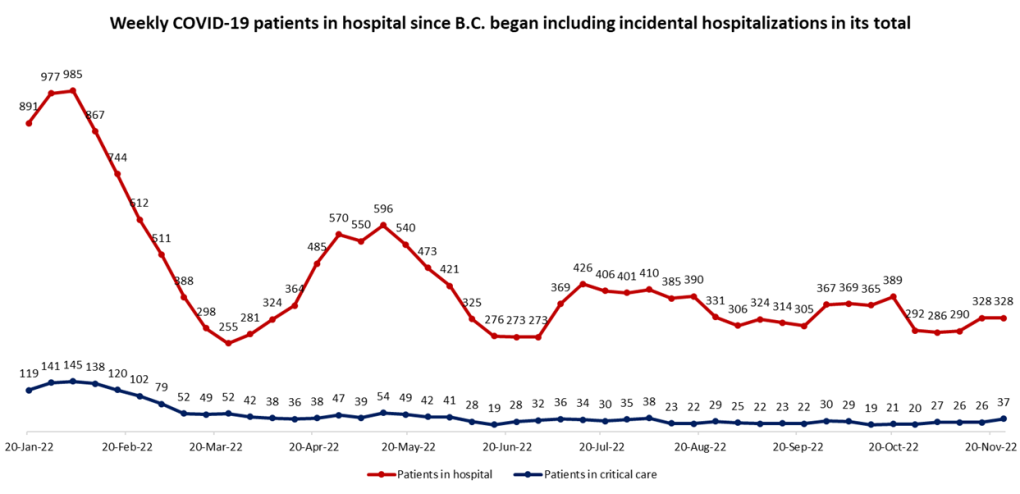More patients in critical care with COVID-19 in B.C.'s latest update
 Courtesy: Shutterstock.
Courtesy: Shutterstock.
British Columbia hospitals are treating the same number of COVID-19-positive patients this week as they were last week, according to the latest update from the B.C. Centre for Disease Control.
The number of patients in critical care, however, has risen to its highest level since early August. There were 37 test-positive COVID-19 patients in critical care in B.C. Thursday, up from 26 last week. The overall number of patients stayed level at 328.
 This graph shows the number of people in hospital and critical care with COVID-19 in B.C. on Thursdays since the province switched to a "hospital census" model in January. (CTV)
This graph shows the number of people in hospital and critical care with COVID-19 in B.C. on Thursdays since the province switched to a "hospital census" model in January. (CTV)
Current hospitalizations in B.C. reflect what the province calls a "hospital census" model. This means the reported numbers include both those with severe cases of COVID-19 requiring hospitalization and those who are admitted to hospital for other reasons and test positive incidentally.
Since the BCCDC began counting hospitalizations this way in January, there have been as many as 985 and as few as 255 patients in B.C. hospitals on Thursdays.
PEDIATRIC RESPIRATORY ILLNESS
B.C. hospitals are currently struggling to deal with a surge in respiratory illness among children, with doctors at Surrey Memorial Hospital reporting quadruple the number of patients for which their emergency department was designed.
This week, BC Children's Hospital activated an overflow unit for its emergency department.
Last week, provincial health officer Dr. Bonnie Henry said COVID-19 is "not what's causing most of the respiratory illness that we're seeing right now," pointing the finger instead at influenza, common cold viruses and RSV.
According to BCCDC data, symptoms of respiratory illness accounted for 6.3 per cent of all doctor visits billed to the province's Medical Services Plan during the week of Nov. 13 to 19, continuing a sharp increase in recent weeks.
Visits for suspected COVID-19 have declined during that time, however, accounting for less than one per cent of all billed visits during the week in question.
COVID-19 STATS
Despite not being the driver of the surge in pediatric respiratory illness, SARS-CoV-2 remained the most detected virus in the province as of last week. The BCCDC had not updated its "pathogen characterization" report as of Thursday afternoon.
There were 498 new lab-confirmed COVID-19 infections in B.C. during the week of Nov. 13 to 19, up slightly from 484 the week before.
Those figures do not include results from rapid antigen tests, nor do they include reinfections among people who previously tested positive on a lab-based test.
Because of this, experts estimate that the province is undercounting infections by roughly 100-fold.
The BCCDC also reported 144 newly COVID-positive hospital patients for the week that ended Nov. 19. That's the same number it reported last week, but initial reports are typically incomplete and revised upwards the following week. Last week's number, for instance, has been revised up to 189 in the latest report.
New hospital admissions are a separate statistic from the "hospital census," which reflects the number of patients currently in hospital, rather than the date they were admitted.
NEW MODELLING REPORT
Thursday's numbers come alongside the latest report from the independent B.C. COVID-19 Modelling Group, which reiterates that the continued circulation of the coronavirus in B.C. is driven by waning immunity in people who were infected, vaccinated or both earlier in the year.
The group says the Omicron subvariant BQ.1, which it estimates accounts for about 50 per cent of new infections across Canada this week, appears to be slightly more evasive of people's immune systems than the BA.5 family of subvariant from which it is descended.
However, the group says waning immunity is still the primary driver of case growth in the country.
"The immune evasion advantage demonstrated for BQ.1 in the lab may allow this virus to infect individuals with waning immunity sooner, but our analyses suggest that most people retain immunity to BQ.1," the report reads.
"COVID-19 cases and impacts will likely rise and fall over the next few months as immunity lost through waning is offset by new immunity, gained by vaccination and/or infections."
VACCINATION DATA
According to the BCCDC, the province administered 129,290 new doses of COVID-19 vaccine from Nov. 13 to 19, a decrease of 2,772 compared to the previous week.
This marks the third straight week that the number of new shots administered in B.C. has declined.
As in previous weeks, the vast majority of the shots administered from Nov. 13 to 19 are categorized as fourth (68,185) or fifth doses (43,340), meaning they were given to people who had already had at least one booster shot.
While more than 4.4 million B.C. residents have had two doses of a COVID-19 vaccine, fewer than three million have had at least one booster.
That leaves more than 1.4 million people – minus a small number, mostly children, who only recently completed their primary course of vaccine – who have likely seen their vaccine-induced immunity wane significantly since their last shot.
CTVNews.ca Top Stories

Former homicide detective explains how police will investigate shooting outside Drake's Bridle Path mansion
Footage from dozens of security cameras in the area of Drake’s Bridle Path mansion could be the key to identifying the suspect responsible for shooting and seriously injuring a security guard outside the rapper’s sprawling home early Tuesday morning, a former Toronto homicide detective says.
Federal government grants B.C.'s request to recriminalize hard drugs in public spaces
The federal government is granting British Columbia's request to recriminalize hard drugs in public spaces, nearly two weeks after the province asked to end its pilot project early over concerns of public drug use.
Stormy Daniels describes meeting Trump during occasionally graphic testimony in hush money trial
Stormy Daniels took the witness stand Tuesday at Donald Trump's hush money trial, describing for jurors a sexual encounter the porn actor says she had with him in 2006 that resulted in her being paid off to keep silent during the presidential race 10 years later.
MPs agree Canadian gov't should improve new disability benefit
The federal government needs to safeguard the incoming Canada Disability Benefit from clawbacks and do more to ensure it actually meets the stated aim of lifting people living with disabilities out of poverty, MPs from all parties agree.
Bye-bye bag fee: Calgary repeals single-use bylaw
A Calgary bylaw requiring businesses to charge a minimum bag fee and only provide single-use items when requested has officially been tossed.
CFL suspends Argos QB Chad Kelly at least nine games following investigation
The CFL suspended Toronto Argonauts quarterback Chad Kelly for at least nine regular-season games Tuesday following its investigation into a lawsuit filed by a former strength-and-conditioning coach against both the player and club.
Boy Scouts of America changing name for first time in 114 years, aiming for inclusivity
The Boy Scouts of America is changing its name for the first time in its 114-year history and will become Scouting America. It's a significant shift as the organization emerges from bankruptcy following a flood of sexual abuse claims and seeks to focus on inclusion.
opinion Tom Mulcair: Trudeau's handling of Poilievre's 'wacko' House turfing a clear sign of Liberal desperation
When Speaker Greg Fergus tossed out Pierre Poilievre from the House last week, "those of us who have experience as parliamentarians simply couldn't believe our eyes," writes former NDP leader Tom Mulcair in his column for CTVNews.ca
New charges for Ont. woman who previously admitted to defrauding doulas
The Brantford, Ont. woman who was previously sentenced to house arrest after admitting to deceiving doulas has been charged again in connection to a new victim.































